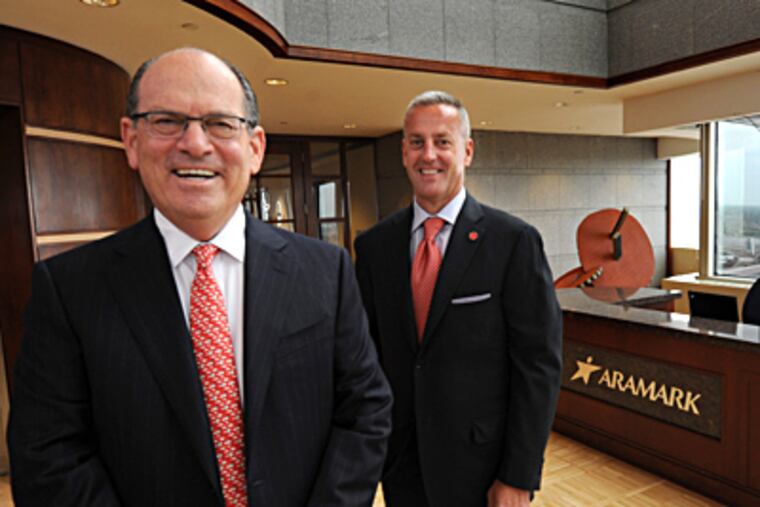Foss to replace Neubauer as Aramark chief executive
Joseph Neubauer, best known as benefactor to some of the region's top cultural organizations, stepped down Tuesday as chief executive of Aramark Corp. after 29 years as its leader.

Joseph Neubauer, best known as benefactor to some of the region's top cultural organizations, stepped down Tuesday as chief executive of Aramark Corp. after 29 years as its leader.
Aramark, one of Philadelphia's largest companies, with a global workforce of 250,000, has hired Eric J. Foss, 53, a former PepsiCo Inc. executive, to succeed Neubauer as president and chief executive.
The move marks the end of an era for the food-services and facilities-management company, which has known just five chief executives since 1936. Though Neubauer, 70, will remain chairman of the board, the change in CEO caps a career in which he built Aramark into a Fortune 500 company, one of only four still based in Philadelphia.
Asked about some of the highlights of his career, Neubauer said in an interview Tuesday that he was proud that Aramark had become a company people wanted to work for and where they could "change their life's trajectory."
For as long as he has run Aramark, Neubauer has kept a low profile in the local corporate community. He typically has declined reporters' requests to interview him.
His personal story can be categorized as an "only in America" tale. Neubauer's family fled Germany in World War II for what was then Palestine. At 14, he journeyed by boat by himself to live with an aunt and uncle in Massachusetts, and arrived knowing very little English.
After earning a chemical engineering degree from Tufts University, he went to business school at the University of Chicago on a full scholarship. He became a banker with Chase Manhattan Bank in New York, where David Rockefeller was a mentor. Later, he joined PepsiCo Inc., where he climbed the corporate ladder before leaving in 1979 to become chief financial officer of what was then called ARA Services.
Tapped as chief executive in 1983, Neubauer would spend the next three decades running a company most people encounter through the food-service personnel staffing concession stands in sports arenas, at hotels and restaurants, in national parks, and at colleges and hospitals. His run as chief executive was interrupted only by a nine-month period in 2004 when he stepped aside for William Leonard, who wound up resigning abruptly.
Neubauer's friends invariably describe him as a smart business strategist, powerful but unassuming, and someone who demands a return on investment from a business deal or a charitable donation. With a home on Rittenhouse Square, he is married to Jeanette Lerman-Neubauer. He has two grown children, Lawrence Neubauer and Melissa Anderson.
David F. Girard-diCarlo, U.S. ambassador to Austria during the second Bush administration and former managing partner of Blank Rome L.L.P., has known Neubauer for three decades. Also 70, Girard-diCarlo said it can be hard to step aside from running a large organization.
"The transition will be hard, but he will handle it with distinction, as he does everything," Girard-diCarlo said.
When Neubauer's name pops up, it is usually in connection with his philanthropic efforts, including the one that led to the Barnes Foundation's move from Merion to a new building on the Parkway. The Philadelphia Orchestra, Widener University, the University of Chicago, and the Metropolitan Opera are among other recipients of donations by the Neubauer Family Foundation.
Rebecca W. Rimel, president and chief executive of the Pew Charitable Trusts, said Neubauer has been "a fabulous partner for me in the work we did on the Barnes."
Acknowledging that leaving the chief executive's chair was a "hard decision" for him to reach, Rimel said she hoped the move would give Neubauer the chance to spend even more time on his civic endeavors.
Neubauer will remain one of the largest shareholders of Aramark, with an ownership stake of 9.7 percent in the company, which has been privately held during much of his time as chief executive.
In 1984, dogged by several unsolicited bids for the then-public ARA Services, Neubauer launched a management-led buyout for nearly $1 billion. Once it became privately held, the company acquired many uniform-rental firms and food-service competitors here and abroad.
In 2001, Aramark completed one of the largest public stock offerings in the immediate aftermath of the Sept. 11 terror attacks, raising more than $740 million in an IPO.
In a talk at Widener in November, Neubauer spoke of "the joy" Aramark employees had felt then about being a public company again.
"We created a lot of wealth for hundreds of people out of what I call selling hot dogs and picking up dirty laundry," he said. "This is not high-tech. This is not pharma. This is just regular, dog-eat-dog, hard work."
In 2006, he led another buyout, this time for $6.3 billion, to take the company private again. Tuesday, he said there were no plans to alter the current ownership structure. The company has been profitable the last two fiscal years, after losing money in 2009.
Foss, who retired Dec. 9 as chief executive of Pepsi Beverages Co., a $20 billion division of the soft-drink maker, said he is joining a company with a "great reputation for quality and a great brand."
Foss said Aramark has "great growth potential," particularly in its health-care and education sectors. He plans a "listening tour" to meet with customers, suppliers, and employees and ask them lots of questions.
Quoting Yogi Berra, Foss said, "You can observe a lot by watching."